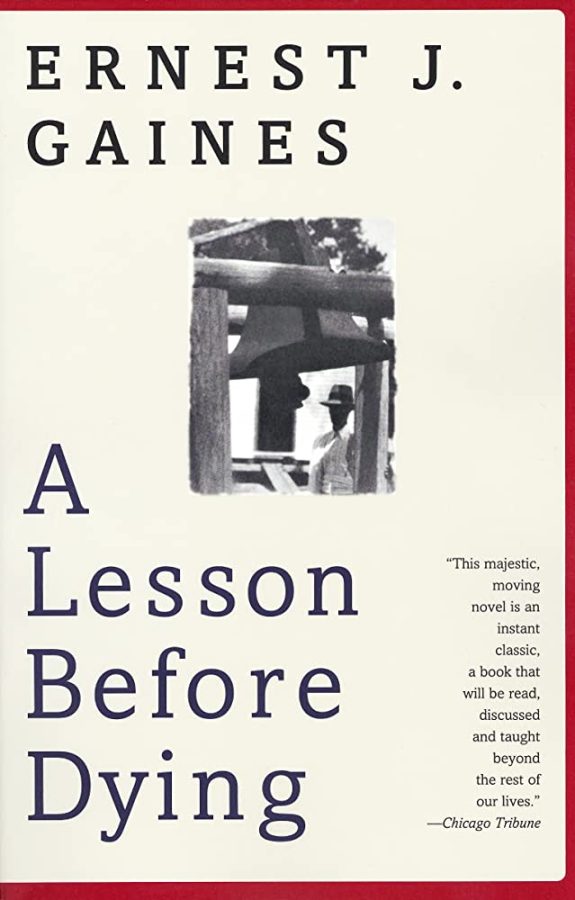Dying with dignity speaks volumes
Book Review: A Lesson before Dying
What would it take you to learn to be human?
Immobile feet, roots sprouting from their soles with tendrils that cling onto the Earth that surround them. Vision obscured by a veil with alternating lattice strips of shock, horror, and death. Stuck in a cavity the size of a canyon, drowning in an avalanche of guilt. Jefferson needs to run, but simply put, he can’t. Jefferson, a young black man living in Alabama during the 1940s, is caught in the middle of a shootout in a convenience store that leads to the deaths of the shop’s owner – a White man – and two young Black men. No matter what Jefferson chooses, he is dead.
In A Lesson before Dying, Ernest J. Gaines crafted a poignant novel that explores themes of racial injustice, manhood, and true freedom.
In all novels, a first sentence is a tool of incredible influence that can either pull the readers in or push them away. In A Lesson before Dying, Gaines opens with, “I was not there, yet I was there.” Introducing this story with a mysteriously vague opening line urges the reader to read further. Immediately afterwards, the reader is thrust into the courtroom during Jefferson’s hearing, injecting them into the bloodstream of the setting. Suddenly, the audience can hear, see, and feel what the narrator, Grant, experiences. They feel the apprehension blossom into hope as Jefferson’s lawyer attempts to convince the jury of his client’s innocence and how later his hope falters and fades.
Labeling Jefferson as a “hog”, his lawyer claims that Jefferson does not have the mental capacity to possibly curate such a plan to kill the shop owner. The all-white jury ignores Jefferson’s lawyer’s efforts to prove he had no involvement and agree that Jefferson is guilty.
Jefferson is sentenced to death by the electric chair for the death of the shop owner and an alliance with the two Black men found dead at the scene of the crime, although no sufficient evidence is provided. Gaines explains the crime, hearing, and decision all within the first chapter of the novel. This is a defining aspect of his style and is seen throughout the novel, straight to the point. This does not mean that the writing is bland; it’s the matter-of-a-fact style that makes everything that much more evocative. The manner in which the narrator and everyone surrounding him accept the news shows how they have grown accustomed and desensitized to the sheer racism in their community and in the world. Each line is a quick jab to the heart that knocks the air out of the reader. Gaines’ writing leaves no room for mystery, informing the reader of Jefferson’s inevitable death from the very beginning. There is no gap in Gaines’s writing that hope can fill.
Despite this, the human spirit is a difficult force to dim. Although Jefferson’s death is looming and imminent, his grandmother is determined to turn this “hog” into a man. This novel follows Grant as he attempts to do so, visiting Jefferson and ultimately forming a symbiotic relationship. As the title suggests, both characters learn valuable lessons before Jefferson’s death. Jefferson learns what it truly means to be a man and subsequently, Grant learns the meaning of true freedom. Despite being sentenced to death, Jefferson reclaims his life and finds that true freedom lies within.
Disregarding backgrounds and experiences, anyone can take something valuable from this book. A Lesson before Dying is a letter to the world that simultaneously pleads people to fight injustice while settling the war that lies confined in the walls of their bodies. Gaines holds the reader’s hand and guides them on Jefferson’s journey to manhood. You can be robbed of your life but your dignity does not have to follow its tail.

Hi! My name is Melissa Martinez and I am a sophomore at Armijo High School. I was born in Walnut Creek, CA but moved to Suisun City just before my second...





